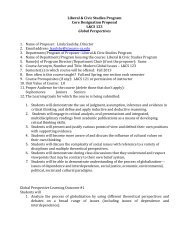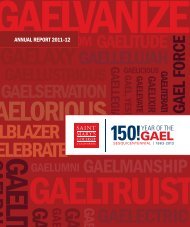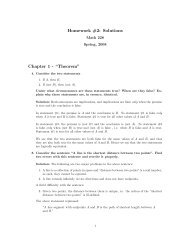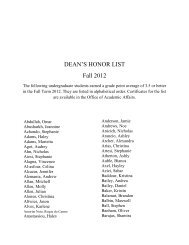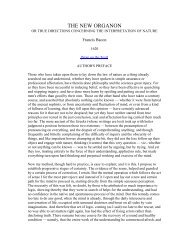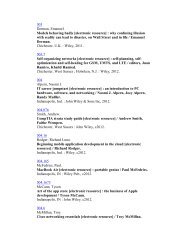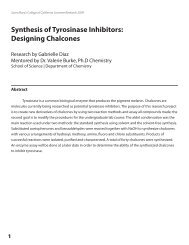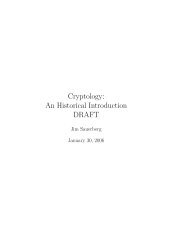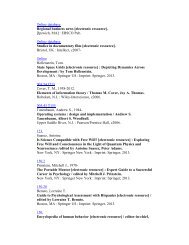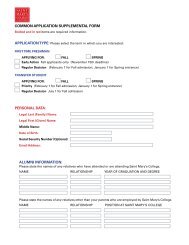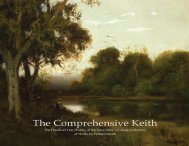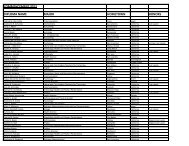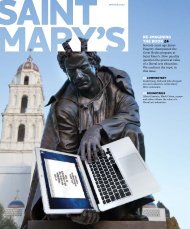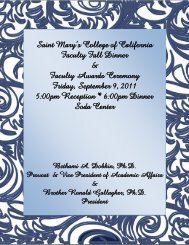2008-09 Catalog - Saint Mary's College of California
2008-09 Catalog - Saint Mary's College of California
2008-09 Catalog - Saint Mary's College of California
You also want an ePaper? Increase the reach of your titles
YUMPU automatically turns print PDFs into web optimized ePapers that Google loves.
Curriculum Communication118 Media LawThis course examines the function <strong>of</strong> the laws regulating media andcommunication and explores how legal, political, social, administrative,economic, and technological factors contribute to determining publicpolicy on media issues. Of primary concern is the First Amendment’srelationship to intellectual property, torts, and telecommunication law.122 American Journalism [Application]An introduction to the craft <strong>of</strong> news writing and reporting in print andelectronic news media. Historical development <strong>of</strong> newspapers, journals,blogs, and magazines — in print, on television/radio, and online; emphasison journalism as a pr<strong>of</strong>ession and ethical conduct.123 Sports Journalism [Application]American culture, its contests and celebrations have moved from thesports page to the front page. This course explores the history, literatureand practice <strong>of</strong> sports journalism in print, TV/radio, and new media. Studentswill examine issues <strong>of</strong> gender and ethics, develop editorial criteriafor sports coverage, and learn the “best practice” in writing for print andbroadcast. Prerequisite: 122.125 Introduction to Media, Technology, and CultureThis introductory core course focuses on the critical and technical conceptsand skills necessary for understanding communication practices inthe 21st century. The course emphasizes three aspects <strong>of</strong> digital literacy:computer literacy, information literacy and visual literacy. As the digitalrevolution has become commonplace, this course places today’s communicationtechnologies in a broader historical context. The course involvesboth theory and practice. Students will be required to create multimediaprojects, as well as learn key theories about digital communication strategiesand approaches in a global, networked digital age. This course is theprerequisite to all upper-division media application courses.132 Audio Production [Application]Recognizing the importance <strong>of</strong> the sonic arts in contemporary forms <strong>of</strong>media, this course introduces students to: (1) basic acoustical theory,(2) musical concepts as related to media production, (3) aesthetic andtechnical elements <strong>of</strong> sound design, (4) audio field recording, and (5)non-linear audio editing and post-production techniques. Prerequisite: 125.133 Video Production [Application]This course introduces students to the basics <strong>of</strong> digital video production.Topics covered include: (1) introduction to film language and sounddesign, (2) video camera basics and video-production workflow, (3)cinematography and lighting, (4) non-linear video editing, and (5) postproductiontechniques. Prerequisite: 125.143 Advanced Media Production I [Application]This course is a continuation <strong>of</strong> media skills and concepts developed in132 and 133. These are upper-division media courses that delve intoareas <strong>of</strong> specialization and advanced applications in media production.Possible topics include web design, digital photography, motion graphics,video game design, animation, DVD authoring, and advanced audioengineering. Prerequisite: 132 or 133.144 Advanced Media Production II [Application]This course is a continuation <strong>of</strong> media skills and concepts developedin 143. These are upper-division media courses that delve into areas <strong>of</strong>specialization and advanced applications in media production. Possibletopics include web design, digital photography, motion graphics, videogame design, animation, DVD authoring, and advanced audio engineering.Prerequisite: 143.147 PersuasionThis course examines the theory and practice <strong>of</strong> persuasive communicationin a variety <strong>of</strong> forms ranging from public relations campaigns tovisual media, political debate, film, fiction, religion, and music. Courseemphasizes the utility <strong>of</strong> classical and modern rhetorical frameworksfor understanding contemporary persuasive efforts in a broad range <strong>of</strong>contexts, as well as other persuasive theories, including Robert Cialdini’sinfluence theory, Sherif’s social judgment theory, and Miller’s informationprocessing theory.158 FilmThis course examines film history and film theory through the lens <strong>of</strong>communication. As a dominant mode <strong>of</strong> communication and as a majorart form, the study <strong>of</strong> film itself ranges from theatrically-based Hollywoodfilms to digital cinema. This course emphasizes the centrality <strong>of</strong> film tothe visual imagination and the development <strong>of</strong> visual culture.161 Communication and Social Justice [Application]This course engages the power <strong>of</strong> communication as a transformativeact. In the pursuit <strong>of</strong> social justice, communication can be a tool, aweapon and a witness on behalf <strong>of</strong> community service, social change andpolitical struggle. The role <strong>of</strong> communication in relation to social justiceis not just studied abstractly, but passionately practiced and embodiedthrough real-world projects and first-hand experiences. This courseinvolves a service-learning component.163 Seminar in Special TopicsThese are topical, special-interest courses exploring an area <strong>of</strong> study orparticular problem in the field <strong>of</strong> communication. Topics cover the range<strong>of</strong> communication theory, rhetoric and persuasion, law and public policy,and visual media.170 Communication Management [Application]The development <strong>of</strong> techniques and strategies for formal rhetorical argumentas applied to informal and formal group processes in contemporarybusinesses. Includes communication management within multiculturalsettings, discussion and analysis <strong>of</strong> organizational needs assessment,communication auditing, and decision-making.190 Student Media Practicum (.25)One-quarter academic credit may be applied to student participationin radio, video, visual, film, journalism, internship, digital media, publicrelations, advertising or independent study. Macken Collegiate ForensicsProgram may be taken for full or fractional credit.*Does not satisfy an area requirement.195 InternshipWork in an appropriate internship position in the field <strong>of</strong> communication,under the supervision <strong>of</strong> a faculty member. Normally open only tocommunication majors in the senior year, with approval <strong>of</strong> the departmentchair and supervising instructor. Majors may qualify with aB average or better.*Does not satisfy an area requirement.197 Special StudyAn independent study or research course for upper-division majorswith a B average or better in communication courses. Permission <strong>of</strong> theinstructor and department chair required.82



